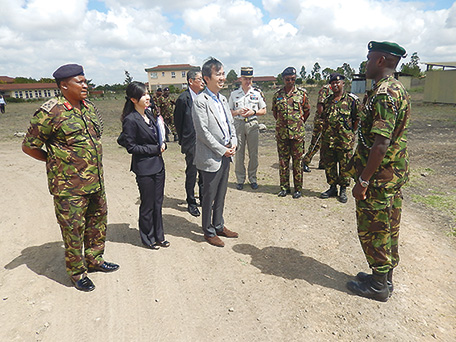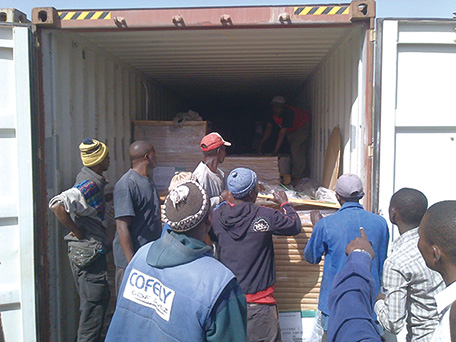(4) Sahel Region
The “Sahel(Note 21) countries” generally include the following eight countries – Mauritania, Senegal, Mali, Burkina Faso, Niger, Nigeria, Cameroon and Chad, although there is no strict definition.
Due to natural disasters, such as drought, as well as poverty and the vulnerabilities in its state functions, issues of political uncertainty, terrorism, the illicit trade of rearms and narcotic drugs, and the threat of organized crimes such as kidnapping are becoming ever more serious in the Sahel region. Moreover, the lenient border control in Libya has encouraged the entry and exit of terrorists, making the region a breeding ground for arms smuggling. Under these circumstances, it is necessary for the region and the international community to improve security capacity and strengthen governance to prevent the entire region from becoming a lawless area. It is also a priority to deal with humanitarian crises, such as the refugee issue, and to promote development.
< Japan's Efforts >

Former Parliamentary Vice-Minister for Foreign Affairs Hirotaka Ishihara visiting the International Peace Support Training Centre in March 2014.
Following the terrorist attack(Note 22) against Japanese nationals in Algeria in January 2013, Minister for Foreign Affairs Fumio Kishida announced the three pillars of foreign policy(Note 23) on January 29. In addition, at TICAD V in June 2013, Japan pledged to continue providing support for the consolidation of peace, including ¥100 billion in development and humanitarian assistance, and has been rapidly promoting efforts to bring peace and stability to the Sahel region.
In 2013, Japan pledged approximately $120 million to help Mali refugees. Japan provided food and accommodation tents for refugees who left Mali for neighboring countries, as well as support for the United Nations Peacekeeping Operation (PKO) training centers in order to improve military and police capacities in West African countries. Also, Japan supports the activities of the African Union Mission for Mali and the Sahel (MISAHEL), which works to promote the reconciliation and political process in Mali and the Sahel region.
Moreover, Japan has been implementing the following counter-terrorism measures in the Sahel region: (i) the Project for Strengthening Criminal Justice and Law Enforcement Capacities in the Sahel Region (approximately $6.81 million); (ii) the Project for Supporting the Consolidation of the Rule of Law and Access to Justice for the Poor Population (approximately $3 million) in Burkina Faso; and (iii) the Project for Consolidation of Peace, Security and Justice (approximately $3 million) in the Islamic Republic of Mauritania.
These assistance projects strengthen the region's ability to deal with the increase in inflow and proliferation of small firearms, and also improve judicial services. As a result, the projects are expected to improve public safety and reduce the threat of potential terrorist attacks in the Sahel region, and by extension, improve the ability of the whole region to cope with these challenges.
In order to establish peace and stability in the Sahel region, Japan will work more closely with countries in the Sahel region, international organizations, and other assistance organizations to provide steady assistance.
- Note 21: “Sahel” is a semi-arid region that stretches along the southern edge of the Sahara desert. It generally refers to West Africa; however, in some cases it includes Sudan and the Horn of Africa area. The word “Sahel” originated from sāhil, which means a coast in Arabic. The Sahel countries are also called the countries at the southern edge of the Sahara Desert.
- Note 22: An armed group attacked a natural gas plant in the Tiguentourine area in eastern Algeria and barricaded inside the plant, taking the workers and other people as hostages. Algerian military forces managed to control the situation by January 19. However, 40 people died, including 10 Japanese nationals.
- Note 23: The three pillars are: (1) strengthening of measures against international terrorism; (2) support for the stabilization of Sahel, North Africa, and Middle East regions; and (3) promotion of dialogue and exchange with Islamic and Arab countries.
| The Sahel region (Senegal, Nigeria, Mauritania, Mali, Burkina Faso, Niger, and Chad)
FY2013 Grant Aid for Conflict Prevention and Peacebuilding in the Sahel Region, “the Project for Strengthening Criminal Justice and Law Enforcement Capacities in the Sahel Region (through UN, implementation agency: UNODC)”
Grant Aid (2013 – Ongoing)

The management unit of ports and harbors inspecting the target container, based on the information from related agencies abroad. (Photo: UNODC)
Due to serious poverty and weak national governments, the Sahel region is prone to becoming a breeding ground for illicit trafficking, including of firearms and narcotic drugs, and for organized crimes such as kidnapping. Consequently, terrorists can easily obtain firearms in the region.
In order to address such a situation, Japan provides support for strengthening criminal justice and law enforcement capacities in seven countries in the Sahel region (Senegal, Nigeria, Mauritania, Mali, Burkina Faso, Niger, and Chad). Specifically, Japan organizes workshops, dispatches survey teams, and provides related equipment through the United Nations Office on Drugs and Crime (UNODC). These measures are aimed at supporting the development of relevant counter-terrorism legislation, promoting regional cooperation in the judicial sector, preventing illegal trafficking of firearms, enhancing the capacity of law enforcement and judicial agencies in investigation and prosecution, and improving government capacities in ocean freight management.
To date, counter-terrorism workshops made possible with Japanese assistance have been held in Burkina Faso, Chad, Mauritania, and Senegal. Each workshop was attended by 10 to 20 members of the judicial sector. In addition, a regional conference was held to discuss firearm control measures and the enhancement of legislative and investigation capacities related to the illegal trafficking of firearms in the Sahel region. The conference was attended by experts in the region. For border control, dispatched Japanese experts provided advice to the Joint Port Control Units (JPCUs) in Senegal.
Such cooperation is anticipated to increase each country's law enforcement capacities and response capabilities of judicial agencies against terrorism and illegal trafficking of firearms. This is expected to lead to improving the security situation in each country in the Sahel region and reducing potential threats such as terrorism, and by extension, increase the entire region's ability to combat terrorism and the trafficking of firearms.
(As of August 2014)
